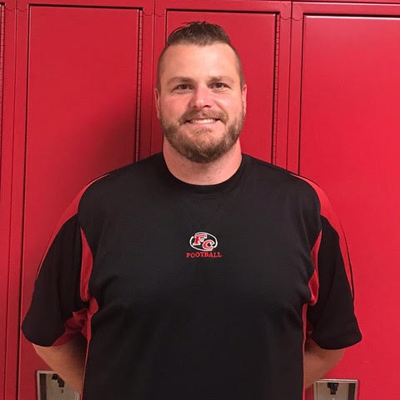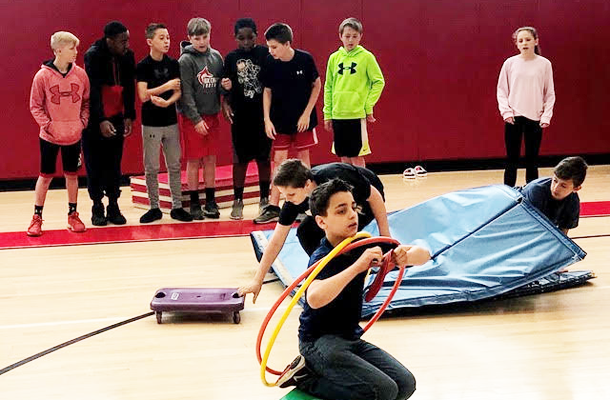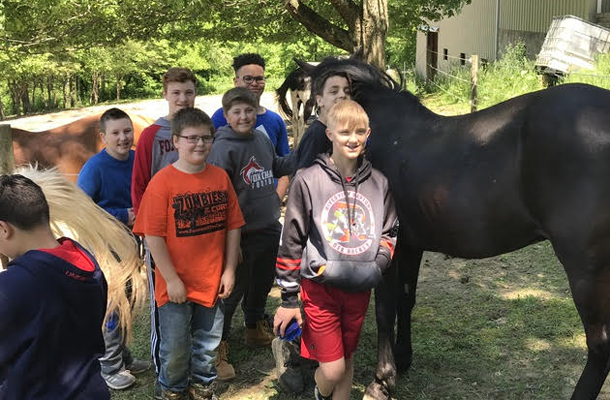 Last football season, Dorseyville Middle School Head Football Coach Josh Duso noticed a pattern with his team, and it wasn’t one that pleased him and his staff. They had a talented team, yet they ended the season 2-4-2. Three of their games were lost in the final five plays, which prompted the coach and DMS teacher to find a way to remedy the problem.
Last football season, Dorseyville Middle School Head Football Coach Josh Duso noticed a pattern with his team, and it wasn’t one that pleased him and his staff. They had a talented team, yet they ended the season 2-4-2. Three of their games were lost in the final five plays, which prompted the coach and DMS teacher to find a way to remedy the problem.
“We could see a ton of promise in these kids, but when you get down to the line, it takes mental toughness and a well-bonded team to pull out a win,” says Coach Duso, who believes positivity is a key to becoming successful. “We thought a program that focused on leadership, commitment, and communication could help to get us over the hump.”
Coach Duso discussed his idea and objectives with DMS social services liaison Ann Flaherty, who also serves as the onsite program coordinator for the University of Pittsburgh’s Maximizing Adolescent Potentials Program (MAPS). What resulted was a four-day leadership training program that was held just before the end of the 2018-2019 school year. Forty upcoming seventh and eighth grade players attended the session. The first three days were held on campus during the Home Base period, and the final day of training was spent at In Stable Hands in Greensburg, Pennsylvania, where horses are integral in the learning experience.
“Horses are known to be highly intelligent animals that will only obey if they trust the human,” Coach Duso explains. “Our players were grouped into teams of six and were asked to lead the horse to a designated area. They first were asked to make a bond with the animal so it would trust them. This took some time. Then, they had to use both verbal and nonverbal communication skills to get the horses to listen. Essentially, the guys learned quickly they could not out muscle a horse, and had to build trust and work together to accomplish the goal. They tried to literally push and/or pull the horses with a lead, but the horses never budged, and they reacted negatively to yelling or jerky movements.”
The experience taught newcomers Issac Jacobs and Luca Catone some valuable lessons about how to show respect for the horses and, in turn, themselves and others. Issac told Coach Duso that “there needs to be a mutual trust to accomplish tasks,” while Luca said, “It takes time for people and animals to trust you, and patience and staying committed is the key.”
Developing Tomorrow’s Leaders
“In competitive sports, we teach our athletes skills, tactics, strategies, and how to get stronger and faster, but they’re never taught how to be leaders,” explains Coach Duso. “You can’t just say, ‘I want you to be more of a leader,’ and expect them to know what to do. This is especially true of middle school students because it’s not easy for them to stand up to their peers and encourage them to do the right thing.”
Another way the players were taught leadership was through an exercise in which the team’s two quarterbacks, Ben DeMotte and Troy Susnak, were asked what they would look for if they were asked to pick their own 7 on 7 teams.
“They both said they would pick the guys who showed up, were very involved with the team, and attended all of the practices and camps,” Coach Duso says.
 One thing that has concerned the coaches is waning commitment during the summer. “We know there are many other things to do during the summer and that kids need time to unwind after a long school year, but you can’t start the season in August. If you do, you’re already starting behind.”
One thing that has concerned the coaches is waning commitment during the summer. “We know there are many other things to do during the summer and that kids need time to unwind after a long school year, but you can’t start the season in August. If you do, you’re already starting behind.”
Finally, a “Communication Line” was used to demonstrate how nonverbal communication could influence dominance in a game. One player was placed on one end of a long hallway and another at the opposite end. They were instructed to slowly approach each other while maintaining eye contact, and to closely observe each other’s reactions.
“Some kids would eventually smile or have a reaction that indicated they were starting to feel uncomfortable,” says Coach Duso. “We were surprised how far apart they were before their nonverbal communication started. Those responses can give players clues of how to dominate on the field. Of course, this isn’t something we want them to do when they aren’t playing, but for the purpose of athletics, the exercise was revealing.”
All of this is has been a great effort to teach young athletes how to develop trust, commitment, character, and respect. Come fall, the coaches hope their efforts will yield better results on the field and for the overall program, but also hope to see how their players’ newfound knowledge helps them in their daily interactions with others.

